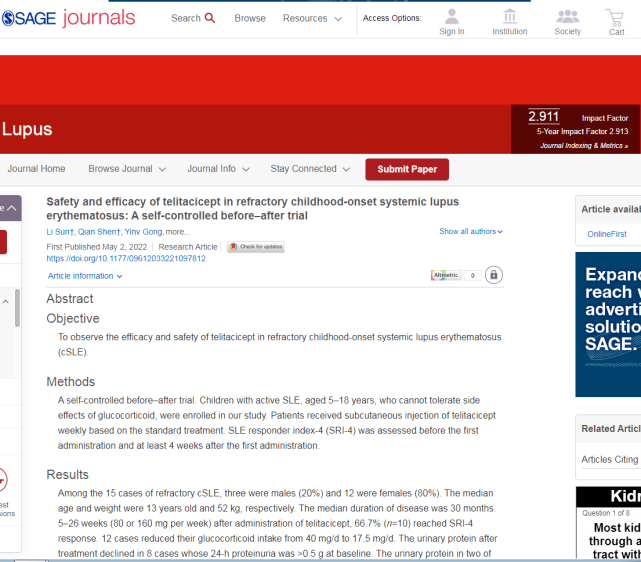On May 9th, RemeGen Co., Ltd. announced that the clinical data of a self-control trial on the safety and efficacy of Telitacicept in treating refractory children's systemic lupus erythematosus was published in the journal Lupus. This is the first report of Telitacicept based on real-world clinical research data of cSLE.
Lupus is the only international journal specializing in lupus and related diseases, including the most promising new clinical and laboratory studies by leading experts in all lupus-related disciplines, including rheumatism, skin diseases, immunology, obstetrics, psychiatry, and cardiovascular research.

The clinical research published in Lupus was led by Professor Xu Hong (Rheumatic Nephrology Department of the Affiliated Pediatric Hospital of Fudan University), Professor Sun Li (Rheumatism Department of Pediatric Hospital Affiliated to Fudan University), Professor Shen Qian (Nephrology Department of Affiliated Pediatric Hospital of Fudan University), Professor Zhao Fei (Children's Hospital Affiliated to Nanjing Medical University), Professor Yu Haiguo (Children's Hospital Affiliated to Nanjing Medical University), Li Xiaozhong (Suzhou Children's Hospital), Professor Chen Yuqing (Anhui Children's Hospital) and Professor Xu Zhiquan (Hainan Women's and Children's Medical Center) participated in a multi-center retrospective study.
This is a pre- and post-control trial for children's systemic lupus erythematosus (cSLE) itself. It aims to preliminary assess safety and efficacy and accumulate experience for future multi-center clinical studies of cSLE and/or children's LN.
The results showed that Telitacicept combined standard treatment can significantly improve the SRI-4 response rate of cSLE patients, reduce the dose of glucocorticoids in refractory cSLE, and also show the effect on lupus nephritis. There were no obvious adverse reactions during the research, and the relevant drug adverse events could be controlled. This means the efficacy of Telitacicept in children's systemic lupus erythematosus and lupus nephritis deserves further in-depth study.
